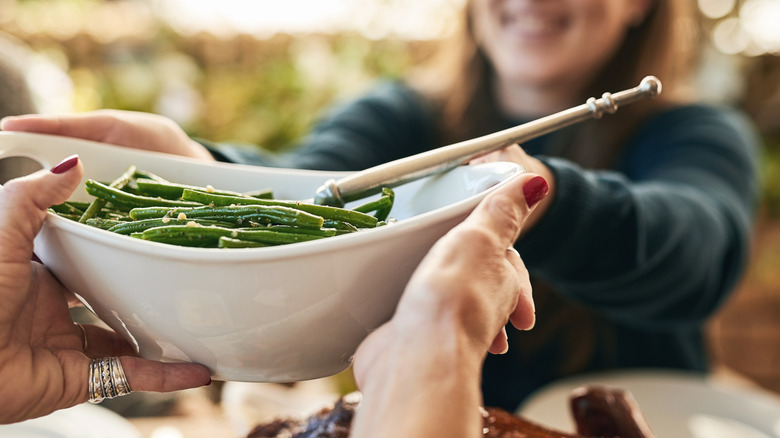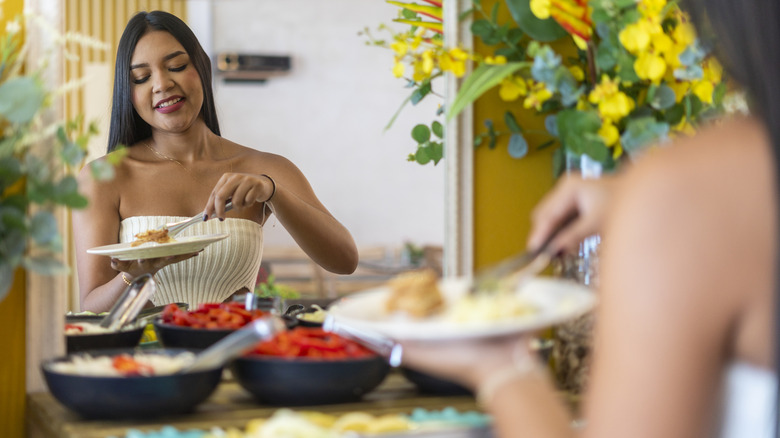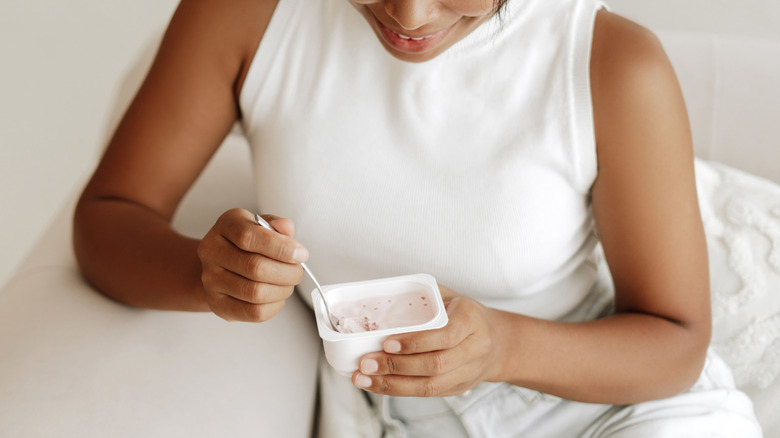Tips For Handling Holiday Meals When You Have A Sensitive Stomach
Holidays and feasting go together like candy canes and sticky, peppermint-y fingers. But eating your way through the year-end festivities can be disastrous for your gut, particularly if you have a sensitive stomach.
What's a sensitive stomach? The term isn't medical and can encompass a wide range of symptoms and conditions related to gut health that, well, don't feel so healthy. For instance, people with disorders that affect the functioning of the gastrointestinal tract, like Crohn's disease, irritable bowel syndrome (IBS), and celiac disease, may find it difficult to comfortably (or safely) consume meals prepared for large groups. Likewise, individuals who have food intolerances may leave holiday gatherings with unwanted gifts like bloating, belly pain, and nausea.
If you know this problem all too well, making a plan ahead of time will leave you with a happier and healthier gut microbiome. You can start by implementing a few tips for handling seasonal spreads.
Eat foods that have minimal ingredients or are easier to digest
A lot of ingredients that you might not tolerate well could be hiding in plain sight on a holiday buffet or dinner table. One way to avoid eating them is to only chow down on whole foods or foods with limited ingredients like white rice, plain chicken, eggs, and applesauce. This might mean skipping a multi-ingredient casserole in favor of a cooked vegetable dish, just to be on the safe (and soothed) side.
What if you're worried that you will end up feeling hungry or having nothing to eat? In that case, you could bring food items. Obviously, talking with the host first is a good idea. Additionally, having an upfront conversation can help you prepare because you'll find out what foods are being prepared for the occasion.
Just don't feel like you have to apologize profusely if you have dietary restrictions, noted etiquette expert Julie Blais Comeau (via Experience Life). "You don't need to make your food needs a source of drama," explained Comeau, who added that "they invited you, so they enjoy your company, and you already know that."
Bypass spicy and fatty options
A surefire way to make your stomach turn somersaults is to overindulge in spicy foods at holiday parties. Yes, that fiery buffalo wing dip may be tempting, but going back for seconds or thirds could leave you with heartburn, reflux, and a restless sleep. (Think back to the last time you overdid the Superbowl snacks that skyrocketed your cholesterol and left your stomach sour.)
As explained by gastroenterologist Dr. Jacob Skeans, "Spicy foods frequently exacerbate stomach discomfort and heartburn, especially for those diagnosed with gastroesophageal reflux disease" (via Everyday Health). Consequently, he recommends avoiding spicy foods if you think you might react. And if you accidentally overindulge, you may want to neutralize the spiciness by chewing gum, which he says can minimize heartburn.
Foods containing a lot of fat can make you feel physically uncomfortable as well, especially if you're given to gut sensitivity. A 2016 study in Advanced Biomedical Research revealed that individuals with dyspepsia (a condition that can lead to well-known sensitive stomach symptoms such as gastrointestinal pain and bloating) were more likely to have unwanted symptoms after eating fatty meals.
Eat slowly to reduce undesirable gut reactions
Even if you eat foods that would typically leave your stomach feeling fine, you could end up with a miserable gut if you eat too much at once. Your stomach has the capacity to stretch to accommodate a surprisingly large amount of food — a full quart. But that doesn't mean you'll feel great as your gut struggles to digest it all. (Learn more about what really happens to your body when you overeat.)
Explained registered dietitian Lauren Harris-Pincus to Eating Well, "An extra large meal can cause digestive discomfort and possibly acid reflux, which can be very unpleasant." In the same article, registered dietitian Lauren Manaker suggested eating black licorice or drinking ginger beverages to calm your stomach if you accidentally overdo it.
Another method to avoid filling your plate with too many goodies is to drink plenty of water throughout your seasonal merrymaking activities. Water will assist your body in digesting what you consume and may prevent after-party constipation.
Treat your tummy to probiotics
Throughout the holidays (and all year, ideally), take probiotics regularly to promote gut health. (It can take weeks for probiotics to work.)
Probiotics are "good" bacteria that help stimulate and support your gut microbiome. As a result, your stomach can more efficiently process the foods that you send its way, even if you have stomach conditions. (Hello, sugar cookies and pumpkin pies — and goodbye extended bathroom breaks.)
You can take a probiotic supplement if you like. However, you can also just eat extra probiotic foods as part of your daily routine. For example, plain Greek yogurt, kombucha, sourdough bread, and pickles are all full of probiotics.
Take it slowly and start adding probiotics a little at a time, though. Registered dietitian Maria Garcia Luis told Cleveland Clinic that gradually increasing probiotics usually nets better results than suddenly overwhelming your body with a probiotic overload that could lead to cramps or diarrhea. As she noted, "If you're not used to eating some of these probiotic foods, you should start slowly by introducing one or two foods at a time."




